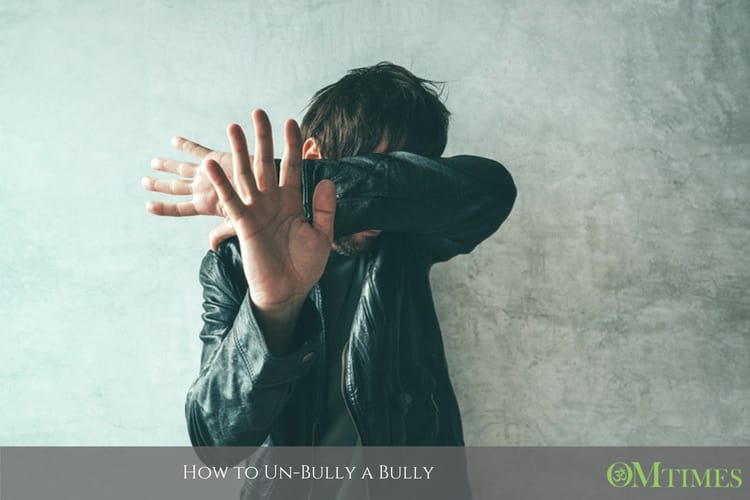How to Un-Bully a Bully

Do you know someone who is a bully and wonder how to deal with them?
How to Reform a Bully
 The subject of bullying has been in the news a lot lately, but do we really understand what a bully is? For that matter, do we know how someone becomes a bully?
The subject of bullying has been in the news a lot lately, but do we really understand what a bully is? For that matter, do we know how someone becomes a bully?
We can agree that no one who’s secure within themselves would feel the need to push around someone smaller or weaker than they are. A truly confident person is comfortable in their own skin and doesn’t need to prove how powerful they are.
If we understand this fundamental truth about human nature, we can see that only those who are tormented by their own perceived failings would choose to engage in bullying.
Although they use intimidation to dominate those who appear weaker, the bully is the real weakling, often backing down at the first sign of assertiveness on the part of their intended victim. When confronted, the bully reveals themselves as a coward whose aggression derives from insecurity.
A bully is created by their parents and society. I believe the growing child has been on the receiving end of contempt or they’ve observed their parents or other adults belittling, abusing or intimidating those who appear less powerful.
The bully has learned from their role models how to be contemptuous toward any signs of human weakness, and since they’ve been made all too aware of their own inadequacies, they become filled with self-loathing.
Experiencing these demonstrations of dominance causes the young child to feel scared, humiliated, even enraged, but has been subject to so much intimidation, it’s far too threatening to get angry at those who hurt them. The unconscious reaction would be to turn that rage inward against themselves.
The bully is filled with intolerable self-directed rage and contempt. Having observed their role models taking out their anger on those who appear inferior, they learn to direct their own pent-up hostility toward other, weaker individuals.
Essentially, a bully is someone who can’t face the aspects of their personality that they believe to be defective or inadequate. Being in the presence of someone who apparently demonstrates these unacceptable attributes is extremely threatening, and this, too, compels the bully to attack them.
The truth is that the bully has more in common with those they pick on than they’d care to believe. They hate their own imperfection, and this hatred gets directed toward their victim. They’re merciless in their abuse because they’re terrified of being seen as having anything in common with their victim.
Bullies are viewed with both anger and fear. They torment their victims and intimidate those in authority. Still, even if they succeed in pushing everybody around, they’ll never feel good about themselves. Walking around with that much self-loathing can’t make for a happy existence. It’s a lose-lose situation if the problem isn’t adequately addressed.
So, can a bully be reformed? Can they learn to be a kind and caring person; to live and let live? The answer is yes, but only if they’re able to heal their self-loathing and develop the same self-acceptance that everyone requires.
The key to reforming a bully is compassion. They must forgive themselves for the cruelty they’ve been exhibiting and understand what’s been driving their behavior.
If a bully can become compassionate toward themselves and can begin to accept all the weak, inadequate and unlovely parts of themselves — traits that every human being shares — then they can be more compassionate toward others.
Contempt is a two-way street, but so is compassion. If a person is filled with contempt toward themselves, they’ll feel the same way toward others, and vice-versa. If, on the other hand, a person is full of compassion for themselves, it’ll be impossible for them not to have compassion for others.
The solution then is not to create sanctions for the bully but to enable them to identify the hurts they experienced while young and to heal their wounded heart. When they can fully accept themselves, they won’t feel compelled to hate or abuse others.
You will also enjoy Are Helicopter Parents Abusing Their Bubble-Wrapped Kids?
About the Author
Marcia Sirota MD FRCP(C) is a board-certified psychiatrist, that does not ascribe to any one theoretical school. Rather, she has integrated her education and life experiences into a unique approach to the practice of psychotherapy. She considers herself a realist with a healthy measure of optimism. Sign up here for her free monthly wellness newsletter.
Dr. Marcia Sirota is a Toronto-based board certified psychiatrist specializing in the treatment of trauma and addiction, as well as founder of the Ruthless Compassion Institute, whose mandate is to promote the philosophy of Ruthless Compassion and in so doing, improve the lives of people, everywhere.




